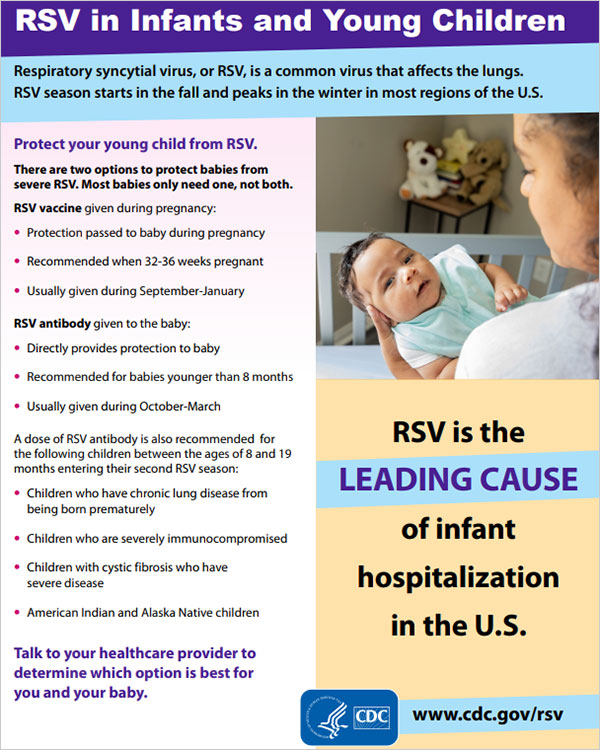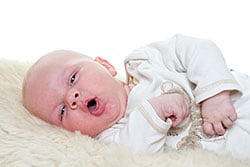RSV in Infants and Young Children
RSV immunizations are recommended only for these groups:
- Infants and some young children: An RSV preventive antibody has been licensed and recommended for infants and some young children.
- Pregnant women: One RSV vaccine (Abrysvo by Pfizer) has been licensed and recommended during weeks 32 through 36 of pregnancy to protect infants.
- Adults ages 60 and older: Two RSV vaccines (Arexvy by GSK and Abrysvo by Pfizer) have been licensed by FDA and recommended by CDC for adults ages 60 and older, using shared clinical decision-making.

RSV in Infants and Young Children | En español
This fact sheet describes how to protect your child from RSV infection.
RSV can be dangerous for infants and young children. Each year in the United States, an estimated 58,000-80,000 children younger than 5 years are hospitalized due to RSV infection. Children at greatest risk for severe illness from RSV include the following:
- Premature infants
- Infants up to 12 months, especially those 6 months and younger
- Children younger than 2 years with chronic lung disease or congenital (present from birth) heart disease
- Children with weakened immune systems
- Children who have neuromuscular disorders, including those who have difficulty swallowing or clearing mucus secretions
Preventive Options to Protect Babies from Severe RSV
CDC recommends you use one of these two tools to protect your baby from getting very sick with RSV:
- An RSV vaccine given during pregnancy
- An RSV immunization given to infants and older babies
Most infants will not need both.
RSV Vaccines for Pregnant People
An RSV vaccine is recommended for those who are 32-36 weeks pregnant during September through January in most of the continental United States. Some areas, where RSV season is slightly different, may have adjustments to the months when RSV vaccine is recommended.
These vaccines provide protection against severe RSV illness in the recipient’s baby for up to 6 months after birth. The protection provided to the baby wanes over time.
RSV Immunization for Babies
RSV antibodies can help protect babies and young children from severe disease from an RSV infection. They provide an extra layer of defense that helps fight RSV infections and protect children from getting very sick. The protection these antibodies provide wanes over time. A preventive antibody is not a treatment for a child who already has RSV infection.
RSV antibody immunization is recommended for all infants who are younger than 8 months, born during or entering their first RSV season. Most infants whose mothers received an RSV vaccine do not need to also get an RSV antibody.
Additionally, a dose of RSV antibody is also recommended for children between the ages of 8 – 19 months entering their second RSV season who are in at least one of these groups:
- Children who have chronic lung disease from being born premature and are requiring medical therapy for their lung disease
- Children who are severely immunocompromised
- Children with cystic fibrosis who have severe disease
- American Indian and Alaska Native children
Severe RSV
Virtually all children get an RSV infection by the time they are 2 years old. Most of the time RSV will cause a mild, cold-like illness, but it can also cause severe illness such as
- Bronchiolitis (inflammation of the small airways in the lung)
- Pneumonia (infection of the lungs)
Some children are at increased risk of severe RSV disease, including those who were born prematurely, or who have chronic lung or heart disease or a weakened immune system.
Two to three out of every 100 infants with RSV infection may need to be hospitalized. Those who are hospitalized may require oxygen, IV fluids (if they aren’t eating and drinking), and mechanical ventilation (a machine to help with breathing). Most improve with this type of supportive care and are discharged in a few days.
Symptoms of RSV

RSV may not be severe when it first starts. However, it can become more severe a few days into the illness. Early symptoms of RSV may include:
- Runny nose
- Eating or drinking less
- Cough, which may progress to wheezing or difficulty breathing
RSV in Very Young Infants
Infants who get an RSV infection almost always show symptoms. This is different from adults, who can sometimes get RSV infections and not have symptoms. In very young infants (less than 6 months old), the symptoms of RSV infection may include:
- Irritability
- Decreased activity
- Eating or drinking less
- Apnea (pauses in breathing for more than 10 seconds)
Fever may not always occur with RSV infections.
Call your healthcare provider if you or your child is having difficulty breathing, not drinking enough fluids, or experiencing worsening symptoms.
CDC’s Respiratory Virus Guidance provides actions you can take to help protect yourself and others from health risks caused by RSV and other respiratory viruses.